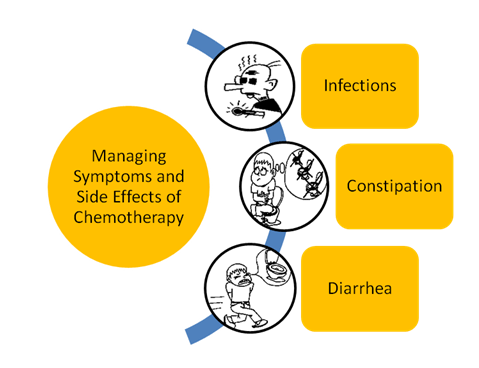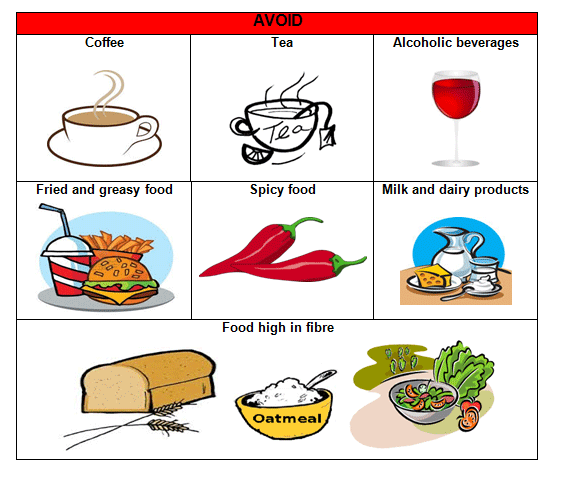
1. Infections
Chemotherapy reduces the production of white blood cells in the bone marrow which help fight off infection. This condition is called neutropenia and it is common after receiving chemotherapy. Therefore patients are likely to get infections after chemotherapy since their immune system is weakened, and any infection can become serious very quickly. A trivial infection could become life threatening within hours if it isn’t treated.
Most chemotherapy medications affect the bone marrow and increase the risk of infection. These effects on the bone marrow usually begin around seven to ten days after each treatment and return to normal between 21 and 28 days.
What are the signs of an infection?
A fever may be the first and only sign of infection. Do not wait for other signs before seeking medical attention. You may need urgent treatment with antibiotics to control the infection or a treatment called granulocyte colony-stimulating factor (G-CSF). This stimulates the bone marrow to produce more white blood cells.
How can I prevent infections?
If your immunity has been affected, there are some precautions you can take to help avoid an infection. These include:
- Avoiding people who have an infection (eg. cough and cold).
- Avoiding crowded areas or places where there is higher risk of picking up an infection.
- Checking with your doctor before you have any vaccines.
- Maintaining good personal hygiene.
- Not sharing food, cups, utensils or other personal items, such as toothbrushes.
- Maintaining good oral hygiene to avoid infected mouth sores.
- Avoiding foods that may contain harmful bacteria (eg. food that has been left out for long, raw food/partially cooked food and unwashed fruit and vegetables).
- Protecting your central or peripherally inserted central catheter (PICC) line (if you have one) from bacteria and damage.
2. Diarrhea
Chemotherapy kills cancer cells as well as other fast-growing cells, such as those in your intestinal lining. If your chemotherapy causes sufficient damage to the lining of your intestine, it may result in diarrhea. Chemotherapy medicationsthat commonly cause diarrhea are irinotecan, capcetabine and 5-fluorouracil.
Diarrhea is most often defined as two or more loose stools in four hours. If you have diarrhea that lasts for more than 24 hours, or if you have pain and cramping along with it, seek immediate medical attention. In severe cases, your doctor may prescribe you with an anti-diarrheal medicine, but do not take any over-the-counter anti-diarrheal medicines without consulting your doctor. If your diarrhea doesn’t get better, you may need intravenous drips to replace the water and nutrients you have lost to avoid excessive loss of fluids from the body (dehydration) which may be life threatening.
How to cope with diarrhea?
These are some of the steps you could take to help you cope with diarrhea:

DO
- Eat smaller portions but more frequent meals
- Drink plenty of clear fluids to replace what you have lost through diarrhea
3. Constipation
Chemotherapy with medications such as vincristine, oxaliplatin and paclitaxel may cause constipation (difficulty passing bowel movements). Others causes of constipation in cancer patients include reduced physical activity, diet changes and consumption of other medications which can also cause constipation such as opiate painkillers (eg. morphine) or supplements (eg. iron and calcium). Inform your doctor if you have not had a bowel movement in more than two days. You may need a laxative (eg. bisacodyl) or stool softener (eg. lactulose or liquid paraffin), but do not use these unless you have checked with your doctor.
Additionally, if you take laxatives regularly over a long period of time, they can cause the bowel to become lazy and it will not work properly. They can also damage the nerve cells in the bowel making it difficult for you to defecate.
How to cope with constipation?
These are some of the steps you could take to help with constipation:
- Drink plenty of fluids to help keep your stools soft.
- Eat plenty of high-fiber foods such as wheat bread, oats and vegetables
- Get some exercise but check with your doctor before increasing your physical activity.
It is important to remember that although the side effects of chemotherapy may be unpleasant, they are short term, will fade once your treatment is completed and there are medications which can help to reduce these side effects.
References
- American Cancer Society (2014). http://www.cancer.org/
- Cancer Research UK (2014). http://www.cancerresearchuk.org/
- National Cancer Institute (NIH) (2015). http://www.camcer.gov/
- Mayo Clinic (2012). http://www.mayoclinic.org/diseases-conditions/cancer/
- British Columbia Cancer Agency (2013). http://www.bccancer.bc.ca/PPI/copingwithcancer/symptoms/
- American Society of Clinical Oncology (2014). http://www.cancer.net/navigating-cancer-care/side-effects/
- Cancer Care (2015). http://www.cancercare.org/publications/24-understanding_and_managing_chemotherapy_side_effects
| Last Reviewed | : | 20 March 2015 |
| Writer | : | Elaine Kan Mei Yin |
| Accreditor | : | Yam Chiew Fong |







